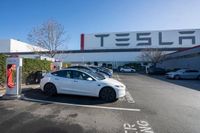The tensions surrounding Tesla Inc. have reached a fever pitch, as a record number of owners are relinquishing their electric vehicles over dissatisfaction with CEO Elon Musk’s political involvement. Data shows Tesla vehicles constituted 1.4% of all trade-ins during the early months of 2025, a notable increase from just 0.4% a year prior. The increasing trade-in figures reflect a broader discontent among Tesla owners regarding Musk’s role as a leading figure in the Department of Government Efficiency under President Donald Trump.
Since February 2025, protests dubbed "Tesla Takedown" have erupted across the United States, with demonstrators voicing their frustrations over Musk’s policies linked to federal workforce cuts and the cancellation of humanitarian contracts. This growing backlash is also evidenced in social media posts where customers display their abandonment or defacement of Tesla vehicles. In videos circulating online, owners can be seen publicly renouncing their allegiance to the brand by either trading in their cars or vandalizing them.
Edmunds analysts noted that declines in brand loyalty among Tesla owners have been stark due to Musk’s political visibility, leaving long-time customers feeling disconnected. Jessica Caldwell, Edmunds’ insights director, articulately pointed out the implications: “Brand loyalty is becoming a bigger question mark as factors such as Elon Musk’s increasing public involvement in government leave some long-time owners feeling disconnected from the brand.”
The tumultuous response to Musk’s involvement with the administration has been exacerbated by numerous incidents of vandalism, including arson targeting Teslas and damage to Tesla showrooms. Trump has even characterized the vandalism against Tesla as an act of domestic terrorism, indicating he would take stringent measures against such actions.
As trade-in figures continue to climb, used Tesla prices have plummeted further, with expectations that reconditioned trade-ins will continue to saturate the market. Reports indicate that Tesla shopper interest has declined to as low as 1.8%, the lowest level recorded since October 2022, a steep drop from 3.3% just months earlier in November 2024. Estimates from Cox Automotive suggest that Tesla’s sales have also dropped 10% in February 2025, with particular weakness in key models including the Model 3, Model Y, and the highly anticipated Cybertruck.
These shifts have prompted concern among Tesla enthusiasts, as international sales in Europe have plummeted, with some countries experiencing declines over 40%. Simultaneously, the company’s Cybertruck—once touted as a revolutionary vehicle—has faced production setbacks: a recall affecting approximately 46,096 vehicles due to safety concerns raised questions about its future.
Interestingly, competitors are witnessing an opportunity amid Tesla’s unraveling brand loyalty. Automakers like Polestar have stepped in, offering significant incentives to attract disgruntled Tesla owners. For instance, Polestar is promoting a conquest bonus that could allow former Tesla drivers to save as much as $20,000 on a new vehicle. This strategic move allows them to seize on the dissatisfaction compounded against Tesla.
In what can be described as a rapidly transforming landscape, the ramifications of Musk’s actions in the political arena are rippling through the automotive sector. While Tesla maintains an optimistic outlook, suggesting that it anticipates a recovery in sales for 2024, the current trends reflect significant shifts in consumer sentiment that cannot be ignored.
This chain of events not only puts pressure on Tesla but also raises critical questions about brand loyalty in an age when consumers are more conscious of the actions and viewpoints of the companies they support.
As electrification continues to reshape the automotive market, brands must navigate not just the challenges of meeting consumer demand but also the unforeseen consequences of their leaders’ public personas. It remains to be seen whether Tesla can reclaim its place as a leader in the EV market, or if the damage to its brand, buoyed by volatile political tides, becomes too great to repair.







